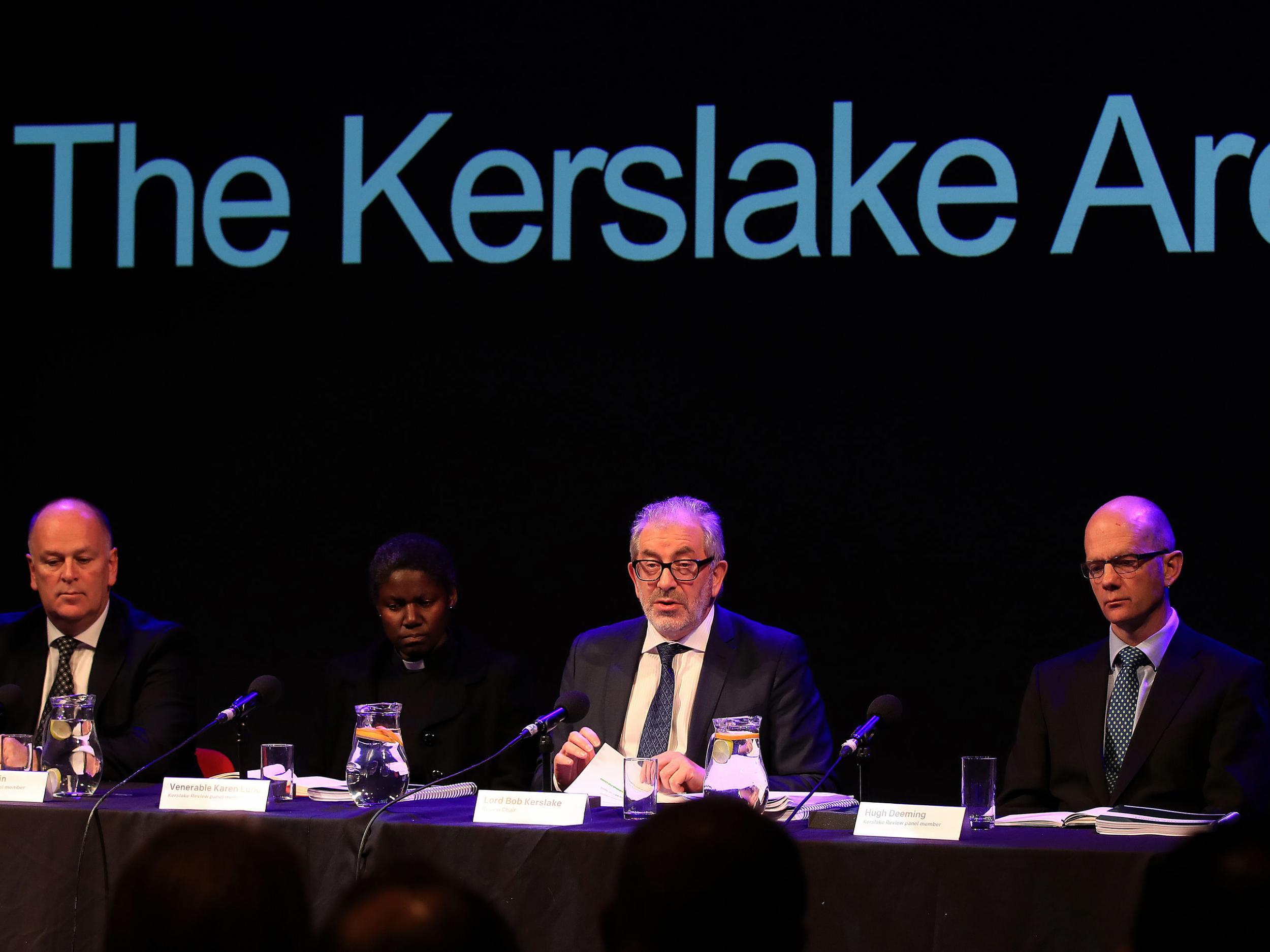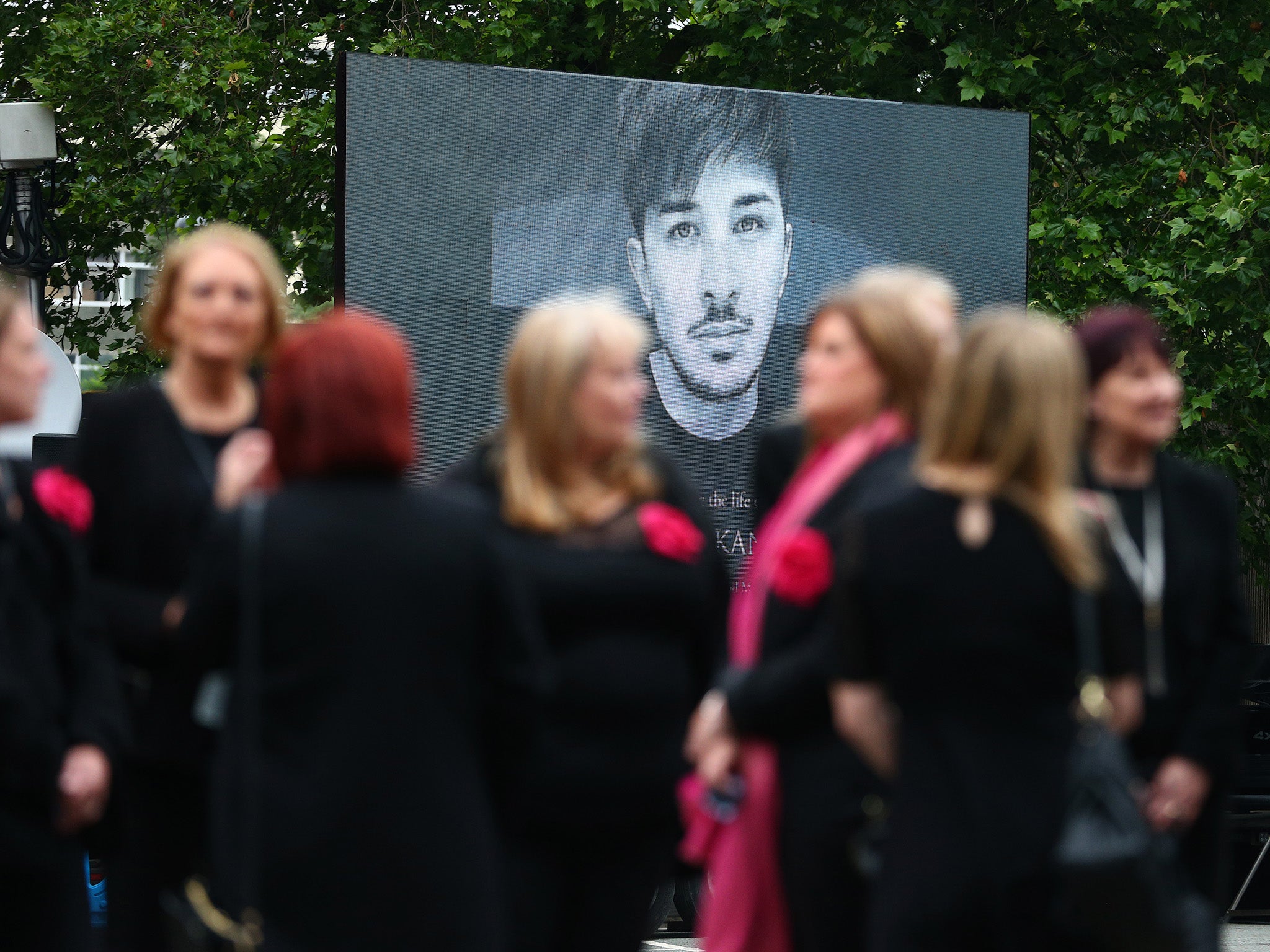Manchester attack victims say UK emergency services must be 'better prepared' after failings at arena
Victims tell inquiry they were evacuated on advertising boards and metal barriers after fire service failings

Your support helps us to tell the story
From reproductive rights to climate change to Big Tech, The Independent is on the ground when the story is developing. Whether it's investigating the financials of Elon Musk's pro-Trump PAC or producing our latest documentary, 'The A Word', which shines a light on the American women fighting for reproductive rights, we know how important it is to parse out the facts from the messaging.
At such a critical moment in US history, we need reporters on the ground. Your donation allows us to keep sending journalists to speak to both sides of the story.
The Independent is trusted by Americans across the entire political spectrum. And unlike many other quality news outlets, we choose not to lock Americans out of our reporting and analysis with paywalls. We believe quality journalism should be available to everyone, paid for by those who can afford it.
Your support makes all the difference.Victims of the Manchester Arena attack said Britain “has to be better prepared” for potential terror attacks in future.
They spoke out after a review into the emergency response to a bombing that killed 22 people last May, found that poor communication and policies meant first-aid trained firefighters did not respond for two hours.
Only three paramedics were working at the blast site in the foyer, where more than 100 people had been injured after suicide bomber Salman Abedi detonated his homemade device among young fans as they poured out of an Ariana Grande concert.
All injured people were evacuated from the blast site within just over an hour of the explosion, but Lord Kerslake said the presence of firefighters “would clearly have been valuable”.
The impact of the delay will be examined by the coroner in ongoing inquests into the victims’ deaths, while a separate criminal investigation continues.
Lord Kerslake said the ambulance service had correctly followed processes to triage casualties and move them away from the scene to be treated, but victims who waited for treatment expressed anger and said they felt abandoned.
They described police officers, private security staff and members of the public trying to help the injured and evacuate them amid a shortage of stretchers.
“I was carried out of the arena on an advertising board,” said one injured person, who was not named in the report.

A member of the public described using metal crowd barriers to carry at leave five casualties to a treatment area in Manchester Victoria station with police officers.
“The time it took for me to receive medical treatment in the arena is a mystery. Why did it take nearly two hours to be moved?” one victim said.
A witness added: “The time it took to get my friend to hospital was far too long.”
A Greater Manchester Police officer, who heard the bomb go off while on routine patrol nearby, said he and colleagues ran into the foyer to be confronted by a “scene I cannot possibly describe”.
“We drove past fans leaving the arena singing and dancing, completely unaware that had gone on,” he told The Independent.
“But as we pulled up to the entrance there were hundreds of people running down the steps. They were covered in blood. There were reports coming out of an active shooter and a bomb; it was incredibly confusing, and we ran straight up the stairs into the foyer.”
The officer, who wanted to remain anonymous, said private security staff and car park employees were already trying to help casualties, without realising some were already dead.
Figen Murray, the mother of victim Martyn Hett, praised responders for “putting their own safety at risk” amid fears of a marauding gun attack.
“Human nature took over, and that’s commendable,” she told Sky News. “But where there have been mistakes, where there have been faults in procedures or systems, they have to be highlighted and improvements have to be made.
“It’s going to happen again, there’s no doubt about it, so next time we have to be better prepared as a country.”
Injured father Martin Hibbert was was not moved from the foyer for almost an hour, and said a blanket was placed over his teenage daughter as if she were dead, although she was alive and survived her injuries.
“There are still no answers [about the wait for treatment],” he told the BBC. “What I get so angry about is if I had lost consciousness or had not managed to stay alive, or to sum up the energy to signal that she was still breathing, my daughter wouldn't be here with us now.
”Somebody made a decision not to allow people to come in. Paramedics that could have dealt with that situation better with the right equipment.”
Ruth Murrell, who was injured alongside her daughter Emily, said “things could have been different”.
“Knowing that has conjured up a real mixture of feelings in us – anger, upset – but at the same time, people who did things right and people who did things well, we've got utmost praise for them,” she added.
The review received more than 200 contributions from bereaved families and friends, those physically and psychologically injured, their relatives and friends, and from people who were at the concert.
Many of the 14,000 people present were groups of teenagers and children accompanied by family members. Ten of the 22 victims were aged between eight and 19, and 22 female.
Some attendees said they did not find out what had happened until after arriving home, amid rumours that the explosion was the sound of balloons popping.
“Me and my friend were some of the first people to exit onto the concourse, which is when we heard the explosion,” said one. “We froze for what felt like ages but was probably only seconds, and luckily there was an exit straight in front of us which we were able to run out of.”
Parts of the arena witnessed “stampedes”, with concert goers climbing over seats to escape amid confusion about where to find safety, while stewards formed a human wall to prevent them heading towards the explosion.
An emergency phone system provided by Vodafone “completely failed”, meaning that people could not reach a central hub for information on casualties until 3am.
Many respondents told the review they did not know where to turn for support following the attack, with some suffering post-traumatic stress disorder, flashbacks, trauma and anxiety causing them to lose jobs and drop out of education.

The distress was compounded by the behaviour of some members of the media, which Lord Kerslake called “utterly unacceptable”, while calling for a review of how the Independent Press Standards Organisation (IPSO) code of practice operates.
People talked about feeling “hounded” and “bombarded” by journalists stationed outside the hospital, a victim liaison centre at the Etihad Stadium and even their homes.
Families searching for missing loved ones and visiting the injured found themselves receiving anonymous phone calls and running a gauntlet of cameras, some of which were directed through windows to capture their emotions.
A member of hospital staff said a note offering £2,000 for information was hidden in a tin of biscuits given to the staff by the press, and that journalists posed as a bereavement nurse and police officers.
Mr Hett’s 16-year-old sister was informed of his death by a reporter who visited the family home, before it had been officially confirmed.
A reporter gave one child condolences on the death of her mother on the doorstep, before the family was officially informed, and another child was stopped by journalists on the way to school.
Lord Kerslake did not name the media outlets or journalists involved publicly, and emphasised that the behaviour was not carried out by all outlets.
Matt Tee, chief executive of voluntary press regulator Ipso, said some journalists had added to the distress experienced by victims’ families and violated the editors’ code of practice.
“We will be looking at what more we can do to support victims, families and the agencies that work with them, as well as making sure that Ipso-regulated publishers are aware of their obligations and responsibilities,” he added.
The Kerslake review made more than 50 investigations for improving the response to terror attacks nationally and locally, and the service provided to victims.
Victoria Atkins MP, the minister responsible for terror victims, said: “This comprehensive report rightly draws on the experiences of those most affected by the horrific attack in Manchester last May to reach its conclusions.
”While Lord Kerslake acknowledges there were parts of the response that worked, the report shows a need for improvement in some areas. All agencies involved in the response should take time to consider the recommendations.”
Join our commenting forum
Join thought-provoking conversations, follow other Independent readers and see their replies
Comments